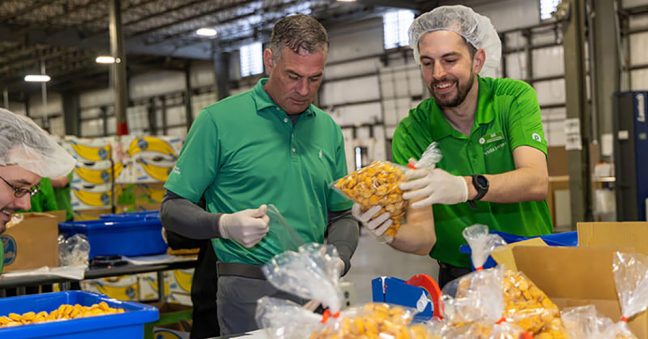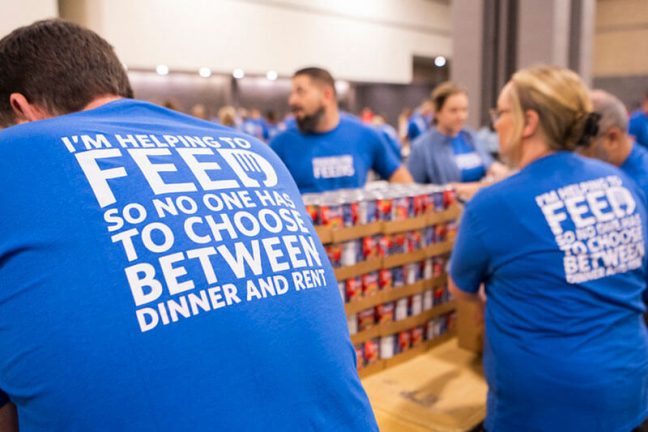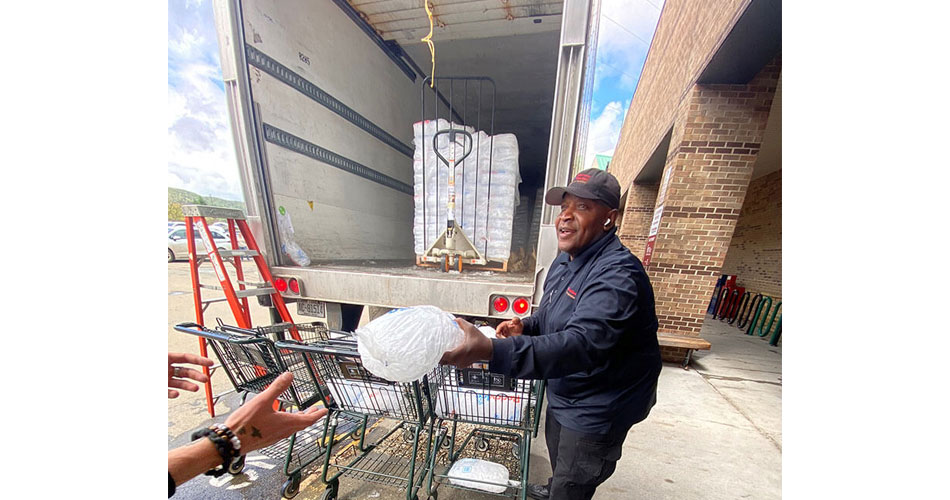In the last weeks of April, roughly seven months after Hurricane Helene ripped through Western North Carolina, new federal and state grant programs were rolled out to help the area continue on the path toward recovery.
On April 25, North Carolina Gov. Josh Stein announced that the U.S. Department of Housing and Urban Development had approved North Carolina’s Helene Action Plan for a $1.4 billion grant to help with rebuilding.
Approval of the plan means North Carolina can begin to receive federal funds from the Community Development Block Grant-Disaster Recovery grant award. These grants focus on long-term rebuilding rather than immediate needs for shelter and are considered “last resort” funds to be used after other recovery sources have been tapped, such as private insurance.
North Carolina’s Helene Action Plan proposes most funds go to housing recovery for low- and moderate-income residents, with the rest for infrastructure rebuilding and economic development.
On April 29, Stein launched a new $55 million grant program to support small business recovery in areas affected by Helene.
The Small Business Infrastructure Grant Program, offered by the North Carolina Department of Commerce and its Rural Economic Development Division, will fund individual grants to a local government up to $1 million to rebuild the public infrastructure that small businesses rely on to operate.
“Western North Carolina’s economy is dependent on its vibrant downtowns and small businesses, and helping them recover is critically important,” said Stein.
Small businesses are classified as those that employ 150 or fewer people. Funding will be awarded on a first-come, first-served basis.
Raleigh’s WRAL News reported April 25 on a State Emergency Response Commission meeting that provided an update on Helene recovery. Western North Carolina residents are still in “desperate need of assistance,” state officials said.
Five people are still missing, and 16,000 continue to live in FEMA transitional shelters. More than 100 people perished due to the storm. About 660,000 dump truck loads of debris have thus far been removed from mountain communities, one official said, adding that there is still much work to do.
Some grocers impacted; all step up
The hardest-hit grocer in Western North Carolina was Ingles Markets, which is headquartered in Black Mountain, near Asheville. Its warehouse was devastated, and according to its website, three stores remain closed due to hurricane damage: at 120 Carbon City Road in Morganton; 125 Greenwood Road in Spruce Pine; and 2299 US 70 Hwy. in Swannanoa.
Robert P. Ingle II, chairman of the board, commented on the recovery in early February, when Ingles reported its first quarter results for the three months ended Dec. 28.
“As recovery efforts progress in the communities we support, we remain dedicated to offering value and providing a wide range of high-quality products to our customers. We deeply appreciate the focus, dedication and hard work of our associates in making this possible,” Ingle said.
Helene brought about “catastrophic flooding which caused power, communication and water outages and major road closures,” Ingle stated. “Four of our stores closed due to damage sustained in the storm, of which one has reopened, and the three remaining stores are currently expected to reopen during 2025. The company estimates that approximately $55 to $65 million of revenue was lost during the three-week period immediately following the storm due to road and power outages, which prevented some stores from opening or maintaining normal store hours, as well as due to electronic payment disruptions as a result of Hurricane Helene.”
During the quarter, Ingles said it incurred about $5.4 million in cleanup and repair costs from the storm. Net sales for the quarter were down 13 percent compared to the prior year, coming in at $1.29 billion. Ingles operates 198 stores in six Southeast states.
Lindsey Kueffner, executive director of the Carolinas Food Industry Council, told The Shelby Report, “It’s hard to overstate the level of destruction caused by Hurricane Helene in Western North Carolina. The impacts were felt by every family and every business regardless of whether they had sustained damage.”
When the storm hit on Sept. 27, power, water and communication lines were severely impacted regionwide, Kueffner said, “which meant that most grocery stores were unable to operate for about week after the storm. Getting these grocery stores back open provided a psychological uplift for the customers they serve. Several grocery stores, including those that were the only grocery store in the community, were hit with significant structural damage, requiring complete rebuilds.”
The good news, she said, is that the area continues to rebound, “and so, too, does the grocery industry. Most stores were able to reopen in at least a limited capacity in October to serve their customers. The stores that required rebuilding are making progress, and we expect them to reopen in 2025.”
As expected, the grocery industry stepped up to help in the aftermath of the storm.
“Grocers worked tirelessly to serve the needs of their communities despite challenges everywhere they turned. There was no power; hundreds of roads were closed; because electronic payment systems were down, banks and armored trucks stretched thin as cash became king; potable water and diesel fuel to operate generators was hard to find; and ice was even harder to find. Their grit and determination are commendable,” Kueffner said.
She commended the CFIC staff for working closely with the emergency operations centers in both the Carolinas “to support our grocers who were on the front lines. The relationships that CFIC has developed over the years allows our team become conduits between the retail grocery industry and different industries so we can all work together to solve problems quickly.
“The outpouring of charitable support from the industry was also touching to see,” she added. “Grocers from across the state made large donations to many of the local charitable organizations, particularly to hunger relief organizations.”
The CFIC board acted quickly to approve a $50,000 donation to Manna FoodBank, the Feeding America branch serving food banks in 16 counties in Western North Carolina.
Manna’s facility was completely destroyed in the hurricane. Warehouse food and equipment, including computers, office equipment, forklifts, refrigeration and freezer units, were all gone. Yet within three days, Manna was back to distributing food, water and supplies, and within a week had moved operations to an empty FedEx facility, Kueffner said.
“CFIC’s donation, along with an outpouring of industry support, has allowed them to upfit their new space and continue serving the 150,000 people that rely on them.”
[RELATED: Grocers Send Relief To Communities Impacted By Recent Hurricanes]
Publix Super Markets donated $250,000 toward building Manna’s “much-needed freezer/cooler space,” said Jared Glover, Publix media relations manager covering North Carolina.

The $250,000 donated in December was part of a special one-off grant the Publix Super Market Charities board approved for capital needs in various areas, he said, adding that the special grant also included a donation of $150,000 to help Black Mountain Home for Children, Youth & Families purchase a mobile trailer and supplies to set up a mobile kitchen to replace their commercial kitchen that was lost in the mudslides.
“Last year when Hurricane Helene devastated parts of Western North Carolina, Publix Super Markets was there from the beginning to aid our neighbors and has continued to do so since then. Whether it was our neighbors, customers or our associates needing some assistance, our doors remained open,” Glover said.
Since none of Publix’s stores had to close due to Helene, neighbors gathered “to charge phones, use the Wi-Fi or just reconnect,” Glover said.
During “Publix Serves Week” this April, CEO Kevin Murphy volunteered along with 40 other Publix associates at Manna FoodBank’s new location in Mills River, North Carolina, to help sort and package produce the grocer donated, as well as handle any other needed tasks.
To date, Publix stores in surrounding areas have donated 913,413-plus pounds of produce to the food bank.
While home state grocer Food Lion had some stores impacted by Helene, all are back up and running, a Food Lion spokesperson told The Shelby Report. As of Nov. 13, Food Lion and its customers had donated more than $3.9 million to ongoing disaster relief.
 “We want our neighbors and communities who were affected by the hurricane to know that Food Lion is here to help them as they continue to rebuild their lives,” Jennifer Blanchard, Food Lion’s director of community relations, said in the November news release. “We appreciate our loyal customers and their willingness to support our efforts. While this is a challenging time, our local partners and neighbors can count on Food Lion to support them in meeting both immediate needs and long-term rebuilding.”
“We want our neighbors and communities who were affected by the hurricane to know that Food Lion is here to help them as they continue to rebuild their lives,” Jennifer Blanchard, Food Lion’s director of community relations, said in the November news release. “We appreciate our loyal customers and their willingness to support our efforts. While this is a challenging time, our local partners and neighbors can count on Food Lion to support them in meeting both immediate needs and long-term rebuilding.”
Food Lion also supplied more than 1.1 million pounds of nonperishable food and water, and associates put in more than 400 volunteer hours.
Another home state retailer, Harris Teeter, saw its associates quickly mobilize to provide on-the-ground assistance and essential supplies to those in need following Helene.
As soon as roads were open for essential operations, Harris Teeter sent trucks filled with water and ice, which were critical for recovery as thousands of residents did not have safe running water or electricity for weeks. The retailer communicated to customers that trucks were coming, and ice and water would be free to anyone who needed it.
Through company donations, vendor support and customer roundups, Harris Teeter contributed more than $1.4 million to Hurricane Helene relief efforts across Western North Carolina and South Carolina.
Part of that donation was a $250,000 check to Manna FoodBank, along with two truckloads each of water and emergency food boxes, providing nearly 40,000 meals.
“Our fleets of trucks and steady supply chains allowed us to get supplies out fast to Asheville, Boone, Greenville and Greer, along with area hospitals. At challenging times like this, it is also a priority for Harris Teeter to support our communities with emergency supplies and resources,” said Danna Robinson, director of corporate affairs and customer relations.
Harris Teeter also provided resources and supplies, including emergency personal hygiene kits, emergency food boxes, clothing and other resources to support associates’ needs.
Hickory-based Alex Lee, parent company of grocer Lowes Foods, donated $500,000 to agencies actively responding to Helene, including Feeding America affiliates serving impacted areas of both the Carolinas and Georgia and the Red Cross.
“As a company based in the Carolinas, we see the need firsthand,” said Brian George, president and CEO of Alex Lee. “We have worked with our vendors and partner agencies to get urgent supplies to the affected areas, but we know that a monetary donation is the most efficient way for these agencies to have the biggest impact. We also know our guests want to make a difference, so we are accepting donations for the Red Cross at our registers. These organizations are equipped with the experience and infrastructure to most effectively help those in need.”
Lowes Foods operates 82 stores in North Carolina, South Carolina and Georgia.
Manna FoodBank CEO Claire Neal provided an update on March 11. She noted that Manna was the first food bank in Feeding America’s history to experience a total operational loss; losses totaled more than $28 million.
Since the storm, Manna has provided more than 7.6 million meals to families across the region, Neal said.
Manna had received about $37 million in aid as of mid-March; she said they estimate that approximately $112 million will be needed over the next three years for Manna and its network of partners in the region to recover from Helene.
Manna’s new 84,000-square-foot facility is “already filled to capacity,” Neal said.
Needed upgrades include a 15,4000-square-foot cooler and freezer, costing about $6.5 million; a new volunteer center and office space; and the replacement of essential equipment like forklifts and refrigerated trailers.
“We know it’s a long road ahead, but this community has proven again and again that, when people are in need, we show up. From all of us at Manna, thank you for being part of this extraordinary community of support. We remain determined to keep moving forward – together,” Neal said.
[RELATED: New Potential Shoppers Continue To Pour Into North Carolina]

